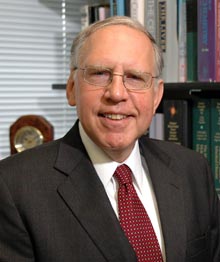
Image: Allan W. Wolkoff, MD
Gastroenterology and Hepatology are commonly organized into a unified division at academic medical centers throughout the country. When Dr. Larry Brandt, chief of the former Division of Gastroenterology, decided to step down from his outstanding tenure of leadership to focus on his research interests, I was asked to take over and merge our divisions, which had been separated for the past few years, into the Division of Gastroenterology and Liver Diseases.
As chief of the former Division of Hepatology, I oversaw the establishment of a very active clinical service in liver, including the new Liver Transplantation Center. This was a terrific opportunity for growth and for building bridges between clinical medicine and research-based activity, particularly the Marion Bessin Liver Research Center which has been around since 1974 but has not had a close connection with the academic clinical components of liver disease. The Liver Research Center has been continuously funded by the NIH since 1974; it is essentially the first GI-liver center established by the NIH in the country. Our research is internationally renowned, and we have some truly fantastic people working here. We hope to move some of their work into a more translational area involving research with humans or material derived from humans. For instance, we have started a liver biorepository where we can freeze tissue and serum from patients with liver disease, with the hope that it will facilitate research. We are expanding our multidisciplinary approach to liver diseases, including fatty liver disease which is rampant in the Bronx, and we are establishing some clinical and research endeavors with other departments such as Genetics and Endocrinology.
In gastroenterology, we are building closer connections with the Albert Einstein Cancer Center (AECC). Colon cancer is an important disease affecting many people. We are working to increase the number of screening colonoscopies for Bronx residents by setting up new programs in collaboration with the hospital to facilitate people being able to schedule a screening colonoscopy within a week and to get the results quickly.
The merger of efforts between the medical school and the hospital center will also lead to some collaborative research into colon cancer and carcinogenesis. We are expanding our coverage of women’s GI health, a particularly important area. Women comprise over half of our population, and these patients are very important to us. When it comes to having GI procedures, many women prefer to have a female doctor. Women may also have GI disorders that are characteristic of their sex, such as abdominal pain, bloating, diarrhea, or constipation that may be associated with irritable bowel syndrome (IBS), so we hope to concentrate on that as well.
Other areas that we hope to emphasize are inflammatory bowel diseases such as Crohn’s Disease and ulcerative colitis. This is an area that we need to grow into with some new faculty recruits.
We are building bridges with the outstanding GI-related basic science being conducted at Einstein. Rather than having people work on a problem limited to laboratory animals such as mice, we hope to expand these endeavors into research involving human patients looking for new insights and cures. A mouse is not a person and a person is not a mouse: there are important differences. Our laboratory animal models can give us ideas as to where to go, but if we really want to cure human diseases, we have to work with people, conducting IRB-approved research respectfully with patients and their families, with the hope that new cures will result.
I am excited about this opportunity to work with a broad spectrum of really outstanding people, both clinical and research based, and to initiate new programs and develop some new areas of clinical involvement. Putting the best brains that we have at Einstein into looking at GI and liver diseases is exciting and important, and we are fortunate that the medical school and the hospital, namely Dean Spiegel and Dr. Safyer, have supported us to the utmost in these new endeavors. Bringing these people together builds a synergy that may lead to exciting developments. I am eager to come to work every day, because this is where groundbreaking discoveries and cures will come from.
Allan W. Wolkoff, MD
Chief, Montefiore Einstein Division of Gastroenterology and Liver Diseases
Associate Chair for Research, Department of Medicine
Professor, Department of Medicine (Gastroenterology & Liver Diseases)
Professor, Department of Anatomy & Structural Biology